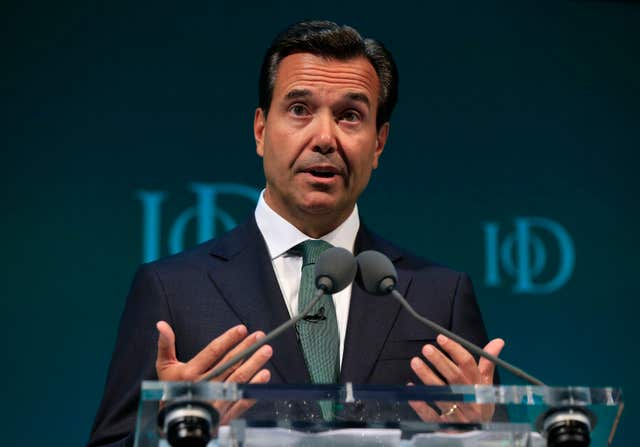Lloyds Banking Group saw profits tumble by 72% in 2020, as it battled with the economic fallout of the coronavirus pandemic.
The bank revealed the extent of the financial devastation caused by Covid-19, as statutory pre-tax profit fell to £1.2 billion, from £4.4 billion the previous year.
It is better than the £905 million analysts had expected, according to a company-compiled consensus, and the bank said it will restart dividend payouts.
Today we announce our 2020 Full Year #LBGResults.
See the highlights below or for a full breakdown, visit https://t.co/f7xfq67b7A#LLOY $LYG pic.twitter.com/HY7SwGq77k
— Lloyds Banking Group (@LBGplc) February 24, 2021
It came as Lloyds booked impairment charges – money it sets aside for loans that could sour – of £4.2 billion, compared with £1.3 billion a year earlier.
It was lower than the £4.7 billion that analysts were expecting, after the bank notched up impairments of just £128 million in the fourth quarter, compared with the £586 million that had been expected.
Net income dropped 16% to £14.4 billion across the financial year.
Chief executive Antonio Horta-Osorio said: “Looking forward, significant uncertainties remain, specifically relating to the coronavirus pandemic and the speed and efficacy of the vaccination programme in the UK and around the world.
“I remain confident that the group’s clear purpose, unique business model, significant competitive advantages and the customer-focused evolution of our strategy we have announced will ensure that the group is able to help Britain recover and, in so doing, help transition to a sustainable economy.”
It is the last set of full-year results for Mr Horta-Osorio, before he is replaced by Charlie Nunn, the head of HSBC’s high street banking unit.

The boss, who has led Lloyds for a decade, will become chief executive of Credit Suisse later this year.
Mr Nunn will take up the post in August, Lloyds confirmed on Wednesday alongside its results.
In his final year, Mr Horta-Osorio saw his total remuneration drop by more than a fifth to £3.4 million.
The board announced that it will be bringing back dividends, which were suspended at the beginning of the Covid-19 crisis, setting an ordinary payout of 0.57p per share, the maximum allowed under Prudential Regulation Authority guidelines.
Dan Lane, an analyst at investment platform Freetrade, said: “For context, that figure was 3.2p in 2018. Outgoing Horta-Osorio did say it was the maximum the bank was allowed to shell out at this stage in the recovery. With impairment charges of £4.2 billion set aside to deal with loans that could turn sour, maybe it’s the astute thing to do right now.
“A huge drop in profits before tax might justify the tentative return to payouts in the eyes of shareholders too.”
Group Chief Executive António Horta-Osório shares his thoughts on today’s 2020 Full Year #LBGResults and on our strategic progress over the last 3 years.https://t.co/TYa6KN9trA#LLOY $LYG
— Lloyds Banking Group (@LBGplc) February 24, 2021
The bank said it will hand each member of staff £400 in Lloyds shares if they stay with the company for at least three years, to recognise their work in 2020.
Employees who are made redundant or retire in the three-year vesting period will be given the award, but voluntary leavers will not.
While Mr Horta-Osorio and other senior executives waived their bonuses last year as Lloyds failed to meet profitability thresholds, the bank hinted that senior staff could be in line for large payouts if profitability rebounds this year.
“For fairness, just as group performance share awards absorbed the impact of the fall in profitability, if there are group performance share awards for 2021 then these should participate in any recovery in profitability,” it said in a statement.
In a recent staff survey, 77% of those questioned said they wanted to continue working from home for several days every week, meaning Lloyds now plans to reduce its office space by around a fifth.
Mr Horta-Osorio said: “I personally believe that this topic will continue to be critical in the months and years ahead, and will also be very important in the reasons that will lead young people and people in general to join companies, if they have a better way of combining their personal preferences with their work obligations.”
The bank’s mortgage book grew by £7.2 billion last year, of which £6.7 billion was in the final quarter alone.
Lloyds saw its highest level of mortgage approvals since 2008.
This was in part due to the Government’s stamp duty holiday, which is currently set to run out at the end of March, but also because people working from home wanted to change their surroundings.
Mr Horta-Osorio said reports that the Government will try to avoid a cliff-edge end to the stamp tax exemption is “the right thing to do”.




Comments: Our rules
We want our comments to be a lively and valuable part of our community - a place where readers can debate and engage with the most important local issues. The ability to comment on our stories is a privilege, not a right, however, and that privilege may be withdrawn if it is abused or misused.
Please report any comments that break our rules.
Read the rules here